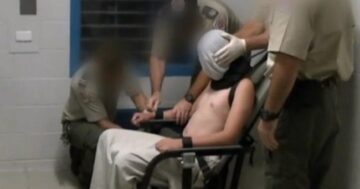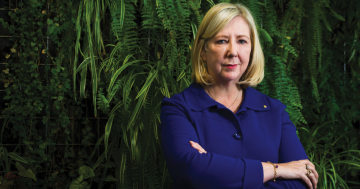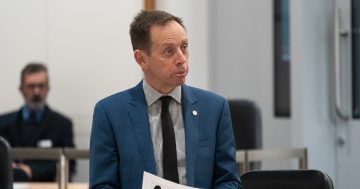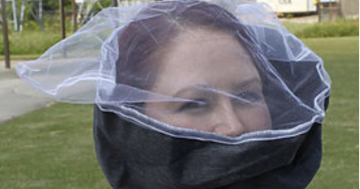
ACT Human Rights Commission Young People Commissioner Jodie Griffiths-Cook says that keeping young children in detention is not conducive to their rehabilitation or imposing accountability. Photo: File.
Were you able to decipher what was right and what was wrong at the age of 14? How about 10?
In Australia, you can be sent to jail before you can legally join Facebook, fly on a Qantas plane unaccompanied, apply for a Medicare card, or be left unattended by a parent or guardian in Queensland.
The age that children should be held criminally responsible for their actions is under debate as a national push is underway to raise the age of criminal responsibility across Australia from 10 to 14.
ACT Human Rights Commissioner Helen Watchirs says that the minimum age of criminal responsibility in Australia needs to be brought in line with United Nations (UN) standards.
“Back in 2005, we called for the age to be raised, but the answer from the government was that it was eight years old until 2000, and they were not going to change it again,” the Commissioner told Region Media.
“We did a human rights audit in Bimberi [Youth Justice Centre] in 2011, and called for the age to be raised to 12.
“We now have the evidence in relation to brain development for complex reasoning regarding consequences and impulse control, which is not developed until the age of 14 generally.
“[In 2019] the UN changed the minimum age from 12 to 14, so that is now the international standard.”
In September 2019, the UN issued general comment 24 regarding children’s rights in juvenile justice. It called for all state parties to increase the minimum age of criminal responsibility to at least 14 years of age, and says that under no circumstances should countries with a higher minimum reduce the age.
ACT Human Rights Commission Young People Commissioner Jodie Griffiths-Cook says that keeping young children in detention is not conducive to their rehabilitation or imposing accountability.
“I have seen 11-year-olds, 12-year-olds and 13-year-olds come in and out of Bimberi. The youngest I understand is 11, but I cannot speak to what happened before my time [in 2016],” she told Region Media.
“At 11, we are talking about a child who is still in primary school. Is that really the place to put a child who would benefit more from some support intervention?
“Most of them are low-level property crimes like burglary and theft. The more serious crimes only make up a very small number of circumstances.”
On top of most crimes committed by young people being minor offences, the delay hearing cases may mean children breach bail unwittingly, such as if visiting family outside the Territory, Commissioner Griffiths-Cook said.
“What we are seeing is kids going in for breaches of bail conditions, even though the original offence itself was one that the court deemed did not require incarceration.
“But then they breach bail by perhaps going to visit their sister or a family member and with that breach, they are taken into Bimberi. It can be something as minor as that.
“It means that kids can be held in detention for quite lengthy periods of time before [going to] court. You can have a child who is in custody for one week, two weeks, three weeks, or months at a time.”
Children need to be offered and directed to support services instead of being herded towards incarceration and detention centres, Commissioner Griffiths-Cook said.
“If they find themselves in criminal proceedings, they have a significantly inhibited ability to understand the nature of those proceedings and be in a position to respond appropriately.
“Because of the malleability of their brain at that time, they are far more likely to accept a plea bargain or a false confession, mainly because they just do not understand what is going on around them.
“The research tells us that the younger a child enters a justice facility centre for the first time, the more likely they are to re-offend. We need to get in early and in the right way and approach things in a more supportive way.
“Locking them up is counter-intuitive to the outcomes that we are trying to achieve. It does not work.”
Although there are legal measures in place to ensure that children who do not know what they are doing are protected, in practice, it is often hard to implement, Commissioner Griffiths-Cook told Region Media.
The legal concept of doli incapax refers to children who are deemed to be incapable of forming criminal intent because of their age and must be proved beyond all doubt.
“The challenge with this presumption is that it is quite subjective in and of itself. What is proving beyond all doubt for one person, can be quite different for another person,” Commissioner Griffiths-Cook said.
“That is the challenge we see in practice, these huge inconsistencies in the way it is applied, and in the way those processes are practised.
“It is often quite prejudicial and the approaches that are used can be led down a path that would otherwise be inadmissible.”
The fact that we lock up children is a lasting shame on Australia, the 2019 President of the Law Council of Australia, Arthur Moses, said in a speech on 10 December last year.
“Across the country, there are around 600 children under the age of 14 in our prisons every year, and 10 of them are just 10-years-old,” he said.
“More than half have not even been sentenced yet. These are some of the most vulnerable children in society. Many have been abused or neglected during their short lives. Many have cognitive impairments.
“They need help and the protection of society. Instead, they are being put into juvenile detention centres.
“This is an indictment on our nation.”
The Council of Attorney-Generals voted in November that a Working Group would undertake targeted and public consultation and present a report to the Council in 2020.




















